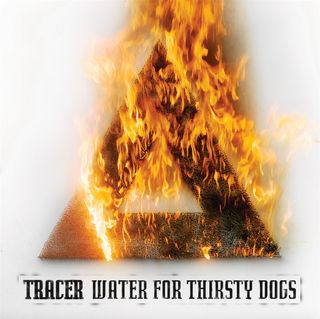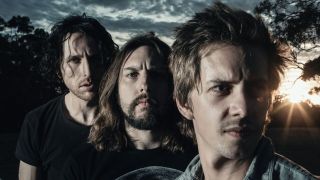Tracer want to make history. Rock history. Music history. And the Australian trio are convinced their third album, Water For Thirsty Dogs, will do exactly that.
“We didn’t want to repeat what’s been done before,” insists vocalist/guitarist Michael Brown. “What’s the point of sounding like Led Zeppelin, The Beatles or Black Sabbath? That’s already been done. There was only one Beatles or Zeppelin, and thank goodness for that. We don’t need a copy of any great band, because what made them great in the first place was that they were unique. And that’s what we want to be. Copying someone else counts for nothing.”
The Adelaide band blasted onto the scene in 2011 with acclaimed debut album Spaces In Between, with Brown joined by his brother Leigh on bass/keyboards/vocals and drummer Dre Wise. Two years later, they returned with El Pistolero, again impressing with their developing style. But for Michael Brown, this was a frustrating period of growth.
“Perhaps it was because we were too young or inexperienced, but for us those albums didn’t quite bring out the sounds we heard in our heads. They didn’t have the individuality we were after. But this time we have got it nailed.”
Brown himself freely admits to growing up steeped in the blues. And there was one guitarist who made a massive impact.
“For me, Stevie Ray Vaughan is the man. I know most people regard Jimi Hendrix as the greatest guitarist of all time. But as far as I’m concerned, Stevie Ray Vaughan was – and still is – the god. But it was when I discovered Audioslave that things really opened up. They made me appreciate you could turn up your amp beyond five. I understood, music could be brash, brave and scream at you. From there, I went backwards to Soundgarden, Pearl Jam, Rage Against The Machine and the Foo Fighters, and then by continuing to go backwards discovered Led Zeppelin and Black Sabbath. That’s when I realised everything can lead back to the blues. Also, music isn’t a straight road, but an organism that connects all sounds.”

For their new album, Tracer took their time and fully focused on their vision.
“At the start of 2014, we made a conscious decision to really make the next album the one that delivers what we always wanted to be about. So, we cut back on the hours we devoted to our day jobs, and rehearsed and jammed at a barn up in the Adelaide hills. By setting ourselves up there we could spend as much time as we wanted on the music and the songs, without being distracted by neighbours. We could turn up the volume very high, and could start as early as we wanted , and go on late into the night.”
And having new bassist Jett Heysen-Hicks in the line-up also helped to create the right environment.
“My brother decided to leave a couple of years ago, because he really didn’t feel he could give the band the full attention it deserved. He saw the way that Dre and I were so passionate and committed to Tracer that he felt the best thing would be to bow out. We were lucky to get Jett in, because he is a monster musician. But it was only when we began working on this new album that we began to appreciate his qualities as a producer and songwriter. He came up with so many ideas; yes, 90 percent of these were shit, but what he did was to help push us out of our comfort zone, which was important.”
Tracer were convinced the way to make the new album radically different was to throw away their influences, discard previously held opinions and really jump off into the musical unknown.
“We wanted to scare ourselves. To come up with bizarre and weird concepts. To try things that made us feel uncomfortable. What this also did was lead to a lot of arguments and tension between the three of us. It wasn’t a pleasant time for the band, but it was necessary, vital. We even cancelled a tour last year to ensure that nothing would deflect us from the primary aim of making a truly landmark album.
“Not everything we experimented with actually worked out. Far from it. But by being open to every idea we have come up with an album that finally represents us.”
Water For Thirsty Dogs was recorded in Los Angeles with producer Erik Reikers, and Brown is full of praise for his input.
“He cut us an amazing deal. It cost us $11000 in total, which is nothing, really. Erik told us not to worry about how much time it took, but to fully focus on making the best album we could. And he was amazing at interpreting the ideas we had into sounds. We would describe what we were after in words, and he’d get it for us straight away. For instance, there was a bass sound we were after, and told Erik that it should represent two pitbulls tearing apart a carcass, so make it fucking happen – he got it on the button!”
How much of this album the band will play live when they tour the UK in November, playing seven shows remains open to conjecture, though.
“We could do all of the album if we wanted. It was important to us to ensure what you hear on this record could be done live; that’s why we only had the three of us involved. I also feel that when you are a trio, it helps to trigger your creativity, because necessity becomes the mother of your inventiveness. But we won’t forget the other two albums when we play live. If fans want to hear certain songs from our past, then we would be crazy not to include them in our set.”
To Brown, Water For Thirsty Dogs isn’t just the best album of Tracer’s career, it’s a potential landmark release.
“I think we have come up with a new rock sound, and could well have opened up a new rock genre – and god knows the music scene desperately needs this to happen. For me, bands like Mastodon, Royal Blood and Muse are pushing the boundaries of rock. Listen to Drones, the new Muse album. It’s the sort of thing Queen would have made today if they were still around. I would like to think our new album could be seen in the same category. We no longer sound like this band, or that band. We sound like… well, we sound like Tracer. We’ve blown away our comfort zone, and now we want to be seen as leaders of a new generation of exciting rock music.”
Water For Thirsty Dogs is released on July 27th, via Odyssey Music.


